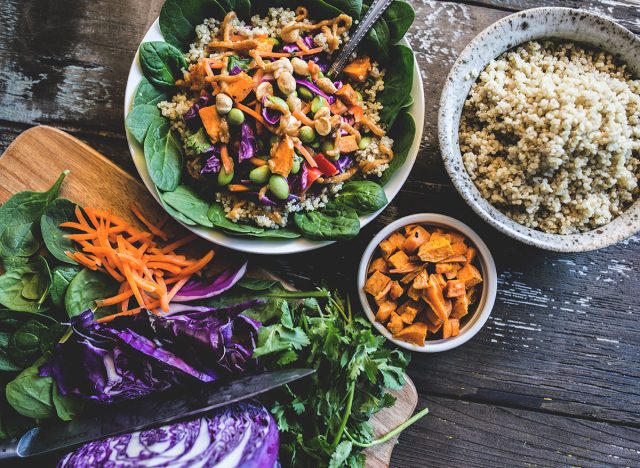The Best Eating Habit to Lower Your Cancer Risk, New Study Says

While there are certain foods that can potentially cause cancer as well as foods that you should avoid if cancer runs in your family, it now turns out that eating a diet that's low in meat or a diet that's totally meat-free can lower the risk of cancer, according to a recent study that was published in the BMC Medicine journal.
Researchers from the University of Oxford took a look at data that was collected from 2006 to 2010 by the UK Biobank. The information came from over 472,000 adults who were between the ages of 40 and 70 years old at the time.
While noting how many participants ate meat and fish, the researchers compared that with instances of cancer while also taking various other health and lifestyle factors into consideration. They found that eating meat five times a week or less frequently resulted in a lower risk of cancer.

As EurekAlert! notes, "the overall cancer risk was 2% lower among those who ate meat five times or less per week, 10% lower among those who ate fish but not meat, and 14% lower among vegetarians and vegans, compared to those who ate meat more than five times per week."
"There is substantial evidence that has been collected over the years supporting that a low-meat or meat-free diet reduces the overall risk of not only cancer but of heart disease, diabetes, and other comorbidities," Marissa Perrotta RDN, owner of Plantable Nutrition & Wellness, tells Eat This, Not That!.
"Meat contains certain carcinogens that may increase your risk of cancer," Perrotta notes while saying that, "in general, meat and animal products are higher in saturated fat and cholesterol," so "when meat is the main focus of a diet, the risk of heart disease and other health-associated risks are increased. While a diet high in meat and animal products is not the cause of cancer, it may increase the risk if you have any family history of cancer and underlying comorbidities."
If you reduce the amount of meat in your diet, you're also likely consuming more plant-based meals.
"A diet that's rich in plants (vegetables, fruits, whole grains, and legumes) is associated with lower risks of cancer and comorbidities because plants contain a variety of antioxidants and phytochemicals that help protect you from free radicals (agents that increase cancer risk)," Perrotta says.
To find out more about why you might want to eat less meat, be sure to read 6 Reasons You Should Stop Eating Meat Right Now.









